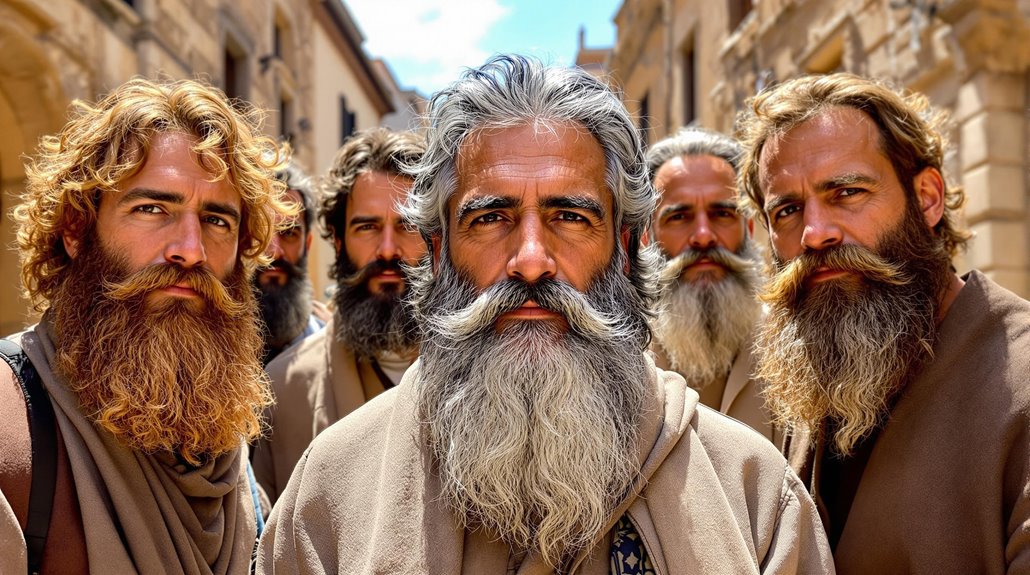What Does "Beard" Mean Spiritually?

Spiritually, a beard often represents wisdom, authority, and maturity. In many cultures, including ancient Israelite and Judeo-Christian traditions, beards are linked to spiritual maturity and divine favor. They symbolize dignity and masculinity, often associated with figures of authority like David and Aaron. Furthermore, gray beards suggest accumulated wisdom, as noted in Proverbs. Across different societies, beards have held significance in religious rituals and cultural practices. In modern times, they also express personal growth and identity, reflecting spiritual beliefs outwardly. Uncover how these connections extend even further into personal expression and community ties.
Beards in Biblical Symbolism
How do beards play a role in biblical symbolism? In ancient Israelite society, beards served as powerful symbols of wisdom, dignity, and masculinity. A well-kept beard was much more than a style choice; it was a reflection of one's social status and spiritual maturity. When you think of prominent biblical figures like David and Aaron, their beards weren't just facial hair—they were markers of authority and divine favor. The Old Scriptures frequently highlights beards as a physical manifestation of a person's inner virtues and adherence to cultural norms.
Leviticus 19:27 provides guidance on grooming practices, indicating that beards were seen as a sign of religious devotion. By following these guidelines, individuals demonstrated their commitment to the faith and the societal expectations of their time. Proverbs further associates gray hair and beards with accumulated wisdom, suggesting that spiritual maturity grows visibly over time.
Even in the New Scriptures, the cultural context implies that Jesus likely had a beard, aligning with the traditions of his epoch. In this way, the beard becomes a symbol that connects you to a rich tapestry of history, representing authority and deep religious roots.
Religious Significance of Beards
A beard isn't just facial hair; it's a profound religious symbol in many traditions. Beards often represent spirituality, wisdom, and dignity, serving as a representation of one's adherence to faith traditions. In Judeo-Christian cultures, beards convey spiritual maturity and devotion. Biblical references, such as Leviticus 19:27, emphasize grooming practices that distinguish the devout from worldly concerns. This distinction underlines the importance of beards in marking religious commitment.
Historical accounts show that beards are linked to religious leadership. In Orthodox traditions, clergy members often wear long beards as visible symbols of their dedication to spiritual matters and faith. This practice reflects their authority and the esteemed role they play within their communities. The cultural significance of beards extends to the Middle East, where they embody male identity and social status, symbolizing strength and piety.
Biblical figures like David and Aaron highlight the authority and divine favor associated with beards. Their presence underscores the spiritual significance of facial hair in ancient Israelite society, marking them as symbols of leadership and respect. Consequently, beards are more than just a personal choice—they're a bridge between personal identity and divine expression.
Cultural Views on Beards

Society's perception of beards has greatly evolved, reflecting both cultural and historical nuances. Across diverse cultures, beards symbolize masculinity and wisdom, often serving as markers of male identity and maturity. In many Middle Eastern traditions, a beard represents dignity and respect, reinforcing traditional gender roles and grooming practices. This cultural perspective highlights beards as more than just facial hair—they're integral to one's identity and self-expression.
Historically, perceptions of beards have fluctuated. For instance, during the Greco-Roman period, a clean-shaven look was preferred, while other times welcomed facial hair as a symbol of honor and authority. Today, there's a resurgence in beard popularity, driven by cultural movements and public figures challenging conventional grooming standards. This shift promotes self-expression, allowing individuals to redefine their identity and spiritual connection through their appearance.
Distinct religious and cultural traditions also have specific grooming practices concerning beards. In some communities, a beard reflects spiritual devotion and a commitment to faith, intertwining personal beliefs with outward appearance. Regardless of being a sign of wisdom, a cultural norm, or a spiritual statement, beards continue to shape and reflect societal values across the globe.
Modern Interpretations of Beards
In recent years, beards have taken on new meanings, often emphasizing personal expression and identity. Your choice to grow a beard can reflect individual beliefs and cultural affiliations, moving beyond traditional norms to adopt modern interpretations. The resurgence of the beard in contemporary society aligns with shifting masculinity ideals. Many see it as a countercultural declaration, rejecting conventional grooming standards dictated by corporate and societal pressures.
Growing a beard isn't just a style choice for you; it's an emotional expedition and a symbol of spiritual growth. It parallels your maturation process, representing the life experiences that shape who you are. Social media plays a crucial role in this, offering a platform where you can engage with a community of like-minded individuals. Here, you can share grooming tips, styles, and personal narratives, fostering a sense of belonging and mutual support.
In some Christian circles, the beard represents faith and commitment, signaling diverse expressions of masculinity and spirituality. As society increasingly accepts these varied interpretations, your beard becomes more than facial hair—it's a reflection of your personal path and evolving identity.
Beards and Personal Growth

Accepting the path of growing a beard is akin to nurturing a seed into a mighty tree; it symbolizes your personal growth and maturation. As you initiate this expedition, you'll find it requires patience and resilience, mirroring life's challenges. The initial stages of beard growth might be tough, as you grapple with societal perceptions and expectations. This period of self-discovery pushes you to accept imperfections and nurture a sense of self-worth, allowing you to define your identity more clearly.
Critics may question your choice, but it's through these interactions that you build emotional resilience. You'll learn tolerance and strength, key components in facing adversity. Your beard becomes a metaphor for transformation, representing the shift from vulnerability to confidence as you acknowledge and express who you truly are.
The act of grooming your beard isn't just about physical maintenance; it's a practice that promotes mindfulness. This routine offers therapeutic benefits, deepening your connection to your personal and spiritual exploration. As you care for your beard, you're reminded of the transformation you're undergoing. Ultimately, this expedition is about more than just hair—it's about accepting your growth and evolution.
Psychological Benefits of Bearding
Growing a beard offers more than a change in appearance; it reveals psychological benefits that improve well-being. Stroking your beard can lower blood pressure and promote relaxation, providing therapeutic effects that improve your general mental state. This simple act not only relaxes you but also connects you with a sense of calmness in your everyday life.
The process of growing a beard can greatly elevate your self-confidence and self-image. Many associate facial hair with masculinity and strength, giving you an empowering sense of identity. As you navigate the ups and downs of beard growth, you develop emotional resilience. Facing both support and criticism teaches you patience and tolerance, making you more adaptable to life's challenges.
Additionally, beards cultivate a sense of brotherhood. They create camaraderie and belonging among those who value shared experiences related to bearding. This connection fosters a supportive network, improving your emotional well-being. Moreover, historical evidence suggests that beards enhance sensory perceptions, allowing you to experience a deeper connection with your environment. This heightened awareness contributes to a sense of empowerment, encouraging you to accept life's experiences with confidence and strength.
Community and Identity Through Beards

Amid the constantly changing landscape of personal identity, beards stand as a powerful symbol of community and belonging. Growing and maintaining a beard isn't just about personal style; it's about connecting with a broader community that shares similar values and experiences. Online platforms and social media amplify this community, offering spaces for discussions on grooming tips, styles, and shared cultural narratives. These platforms foster a sense of camaraderie and emotional support among like-minded individuals.
Organizations like the Society of Bearded Gentlemen further elevate this sense of belonging by promoting camaraderie and emotional support within the bearding community. By participating, you can forge deeper connections and friendships through the shared experience of beard growth. This shared expedition often leads to bonding over the challenges and triumphs involved, reinforcing individual identities within the group.
Beards also serve as a link to cultural and historical narratives, contributing to a collective identity among bearded individuals. Embracing these narratives helps reinforce your sense of purpose and resilience within your community. Consider the following aspects of the bearding community:
- Grooming discussions
- Shared cultural narratives
- Emotional support systems
- Camaraderie among members
- Resilience in shared challenges




